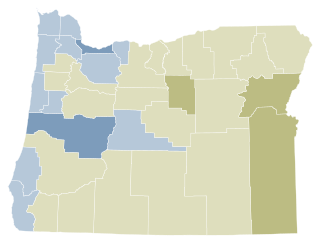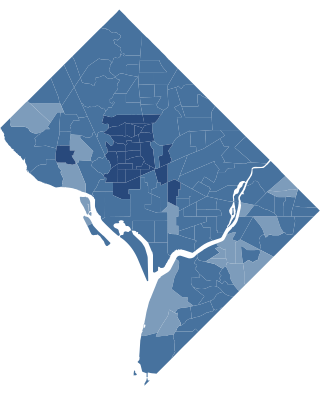
Psilocybin mushrooms, commonly known as magic mushrooms,shrooms, or broadly as hallucinogenic mushrooms, are a polyphyletic informal group of fungi that contain psilocybin, which turns into psilocin upon ingestion. The most potent species are members of genus Psilocybe, such as P. azurescens, P. semilanceata, and P. cyanescens, but psilocybin has also been isolated from approximately a dozen other genera, including Panaeolus, Inocybe, Pluteus, Gymnopilus, and Pholiotina.

The Oregon Medical Marijuana Act, a law in the U.S. state of Oregon, was established by Oregon Ballot Measure 67 in 1998, passing with 54.6% support. It modified state law to allow the cultivation, possession, and use of marijuana by doctor recommendation for patients with certain medical conditions. The Act does not affect federal law, which still prohibits the cultivation and possession of marijuana.
Term limits legislation – term limits for state and federal office-holders – has been a recurring political issue in the U.S. state of Oregon since 1992. In that year's general election, Oregon voters approved Ballot Measure 3, an initiative that enacted term limits for representatives in both houses of the United States Congress and the Oregon Legislative Assembly, and statewide officeholders. It has been described as the strictest term limits law in the country.

Drug policy of California refers to the policy on various classes and kinds of drugs in the U.S. state of California. Cannabis possession has been legalized with the Adult Use of Marijuana Act, passed in November 2016, with recreational sales starting January of the next year. With respect to many controlled substances, terms such as illegal and prohibited do not include their authorized possession or sale as laid out by applicable laws.

Elections in Oregon are all held using a Vote by Mail (VBM) system. This means that all registered voters receive their ballots via postal delivery and can vote from their homes. A state Voters’ Pamphlet is mailed to every household in Oregon about three weeks before each statewide election. It includes information about each measure and candidate in the upcoming election.
The U.S. state of Oregon has various policies restricting the production, sale, and use of different substances. In 2006, Oregon's drug use per person was higher than the national average, with marijuana, methamphetamine, and illicit painkillers being the most commonly used substances.

The legal status of unauthorised actions with psilocybin mushrooms varies worldwide. Psilocybin and psilocin are listed as Schedule I drugs under the United Nations 1971 Convention on Psychotropic Substances. Schedule I drugs are defined as drugs with a high potential for abuse or drugs that have no recognized medical uses. However, psilocybin mushrooms have had numerous medicinal and religious uses in dozens of cultures throughout history and have a significantly lower potential for abuse than other Schedule I drugs.

Oregon Ballot Measure 80, also known as the Oregon Cannabis Tax Act, OCTA and Initiative-9, was an initiated state statute ballot measure on the November 6, 2012 general election ballot in Oregon. It would have allowed personal marijuana and hemp cultivation or use without a license and created a commission to regulate the sale of commercial marijuana. The act would also have set aside two percent of profits from cannabis sales to promote industrial hemp, biodiesel, fiber, protein, and oil.
Peter Zuckerman is an American journalist and author who has focused his career in court reporting, investigative journalism, and adventure stories. He is also a leader of several prominent progressive political campaigns.

Oregon Ballot Measure 91 was a 2014 ballot measure in the U.S. state of Oregon. Its passage legalized the "recreational use of marijuana, based on regulation and taxation to be determined by the Oregon Liquor Control Commission".

Oregon Psilocybin Society is a nonprofit organization founded in 2016 with the direct intention of creating awareness around and laying a foundation for the legislation of psilocybin services, a sequence of supervised sessions which includes the use of psychedelic psilocybin mushrooms for adults in the U.S. state of Oregon. The founders of the society, Sheri Eckert and Tom Eckert, are the Architects and Chief Petitioners of Measure 109, Introducing an initiative to Oregon state voters for 2020. This legislation will create legal access to psilocybin assisted services to any individual over 21 years of age, upon passing a risk assessment for contraindications. Psilocybin assisted services will be provided on-site at a licensed facility by a licensed facilitator. The service progression would include, at minimum, a preparation session, a psilocybin administration session, and an integration session. All sessions would be conducted by trained facilitators.

Dr. Bronner's Magic Soaps is an American producer of organic soap and personal care products headquartered in Vista, California. The company was founded in the late 1940s by Emanuel Bronner and continues to be run by members of the Bronner family. The company's products are known for their text-heavy labels and the variety of their advertised uses for a single product. The company's 2017 annual revenue was $120 million.

A general election was held in the U.S. state of Oregon on November 3, 2020. Primary elections were held on May 19, 2020.

The movement to decriminalize psilocybin in the United States began in 2019 with Denver, Colorado, becoming the first city to decriminalize psilocybin in May of that year. The cities of Oakland and Santa Cruz, California, decriminalized psilocybin in June 2019 and January 2020, respectively. Washington, D.C., followed soon in November 2020, as did Somerville, Massachusetts, in January 2021, and then the neighboring Cambridge and Northampton in February 2021 and March 2021, respectively. Seattle, Washington, became the largest U.S. city on the growing list in October 2021. Detroit, Michigan, followed in November 2021.

Arizona Proposition 207 was a voter initiative that appeared on the November 3, 2020, Arizona general election ballot to legalize cannabis for recreational use. Passing with 60% of the vote, the initiative legalized the possession of up to an ounce of cannabis, licensed sales at dispensaries, and personal cultivation of up to six plants. Along with Montana, New Jersey and South Dakota, Arizona is one of four states that legalized recreational marijuana via ballot measures in 2020.

Initiative 81 was a Washington, D.C. voter-approved ballot initiative that changed the police priorities related to the possession, consumption, and cultivation of entheogenic plants and fungi. The short title of the initiative was Entheogenic Plant and Fungus Policy Act of 2020. The measure was approved by 76% of voters on November 3, 2020 and went into effect on March 16, 2021.

New Jersey Public Question 1, the Constitutional Amendment To Legalize Marijuana, was a measure that appeared on the November 3, 2020 New Jersey general election ballot. Question 1 legalized the possession and recreational use of cannabis; although planned to go into effect January 1, 2021, implementation was delayed until February 22 due to a dispute between the governor and legislature over penalties for underage cannabis users. Retail sales are also allowed under the amendment.
Shroom House is a pair of shops which have sold psychedelic mushrooms illegally in Vancouver, British Columbia, Canada, as well as Portland, Oregon, United States.













